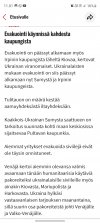When Vladimir Putin became Russian president in 2000, however, he decided that – at least at the Russian end – this wealth machine needed to be brought in house. If anyone was going to get rich from exporting gas, it was going to be him and his friends, not Gazprom managers and their shady enablers. It took him a little while to wrestle the old guard out of the door, but eventually he had a loyalist in charge of the gas giant. There would still be an intermediary company between Russia and Ukraine, so the money flows would remain hidden, but that company would be half-owned by Gazprom to ensure Putin got his share. Its name was RosUkrEnergo (RUE), and it took over gas supplies between the two countries in July 2004.
That was a big year in Ukraine. In the autumn, the prime minister, a thug called Viktor Yanukovich who was heavily backed by Putin, tried to win the presidency by rigging an election. Hundreds of thousands of Ukrainians took to the streets of Kyiv, waving the orange flags of Yanukovich’s rival Viktor Yushchenko. After weeks of continuous protests, the election was reheld and Yanukovich lost. For many young Ukrainians this moment – known as the Orange Revolution – was a glorious expression of how ordinary people can triumph over the corrupting influence of oligarchs and their money.
For Putin, however, who had spent time and money backing Yanukovich, Ukraine’s revolution was a personal humiliation. But he had a useful way to remind Ukrainians – and any other countries tempted to follow Ukraine’s lead – why humiliating the Kremlin was a bad idea. Gazprom told the post-revolutionary government it would be renegotiating its gas supply contract, and when Ukraine refused to agree to its terms, cut it off. In the depths of winter, the whole country suddenly realised quite how dependent it was on Russian goodwill. In some parts of Ukraine it was -30C. Those kinds of temperatures kill, so it was really no choice at all. Yushchenko capitulated and signed the new deal with RUE, a humiliation that split the coalition that had powered the revolution, and from which his reputation never recovered. RUE was already doing well under the old contract, and now the money really started to flow.
“Only one source of power proved to be stronger than the Orange Revolution,” wrote the scholar of international relations, Margarita M Balmaceda. “Not (former) PM Viktor Yanukovich, not Russia, but the power of energy-related interests.”
But who were those interests? Who actually were the owners of RUE? Everyone knew that Gazprom owned half of the company, but who owned the other half?






